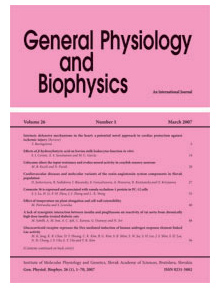Journal info
|
||
Select Journal
Journals
Bratislava Medical Journal Ekologia - Ecology Endocrine Regulations General Physiology and Biophysics 2025 2024 2023 2022 2021 2020 2019 2018 2017 2016 2015 2014 2013 2012 2011 2010 2009 2008 2007 Neoplasma Acta Virologica Studia Psychologica Cardiology Letters Psychológia a patopsych. dieťaťa Kovove Materialy-Metallic Materials Slovenská hudba 2025Webshop Cart
Your Cart is currently empty.
Info: Your browser does not accept cookies. To put products into your cart and purchase them you need to enable cookies.
General Physiology and Biophysics Vol.27, p.263-270, 2008 |
||
| Title: Long-term exercise training affects age-induced changes in HSP70 and apoptosis in rat heart | ||
| Author: Farhad G. Soufi, Safar Farajnia, Naser Aslanabadi, Naser Ahmadias, Mohammadreza Alipour, Mohsen Alipour, Yousef Doustar, Jalal Abdolalizadeh and Farzam Sheikhzadeh | ||
| Abstract: The aim of this study was to test the effects of age and long-term exercise training on antioxidant, heat shock protein 70 (HSP70) expression and apoptosis by comparing the hearts of sedentary and trained rats. Training groups went under 3-, 6- and 9-months of regular exercise (25 m/min with a 0% slope, 60 min/day and 6 days/week). Level of glutathione increased with age in trained and sedentary control rats but level of this factor unchanged by training. Activity of mitochondrial superoxide dismutase (mtSOD) increased in heart homogenates of 6- and 9-months trained animals as compared with their sedentary. The rates of apoptosis were increased with age but level of apoptosis in 9-months trained group was significantly lower than corresponding sedentary. Levels of HSP70 expression were significantly decreased with age while long-term training induced marked increase in HSP70 expression levels. These results show that a long-term regular exercise affects age-induced changes in mtSOD, HSP70 and apoptosis as it increases mtSOD activities and HSP70 expression levels and elicits a marked reduction in apoptosis rate in rat myocardium. However, a shorter training program is not effective. |
||
| Keywords: Farhad G. Soufi1,2, Safar Farajnia1,3, Naser Aslanabadi1,4, Naser Ahmadiasl1,4, Mohammadreza Alipour1,5, Mohsen Alipour6, Yousef Doustar7, Jalal Abdolalizadeh1 and Farzam Sheikhzadeh | ||
| Year: 2008, Volume: 27, Issue: 4 | Page From: 263, Page To: 270 | |
|
|
 download file download file |
|

